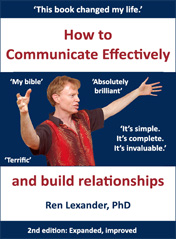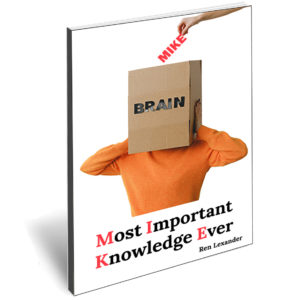FORTHCOMING
2nd Edition – expanded and improved – coming soon
The quality of your relationships – business or personal – is totally determined by the the quality of your communication.
This books teaches you simple models and strategies that will revolutionize your relationships.
(Comments refer to the 1st edition:)
‘This book changed my life.’
‘The best book I have bought in a long time’
‘AWESOME’
‘…my bible’
‘Absolutely brilliant’
‘It’s simple. It’s complete. It’s invaluable.’
Testimonials (for the first edition)
“Never before have I actually lost sleep reading a book from the shelves of self-help. I was blown away with the clarity Dr Ren Lexander provides around the communication points where challenges begin. And then… the gem worth a 1,000 times the cover price: for each of these he provides achievable, understandable and doable ‘stick-on-the-fridge-door’ steps to actually achieve everything the title promises. This book changed my life.”
– Josephine Pennington,National Executive Manager Testing Policies and Standards, Commonwealth Bank
“One of the most useful, positive and helpful books I have ever read… Very enjoyable but also practical and usable.
I have actually read it many times over and it is something that I have used just about every day… Your book was excellent and has been my bible”
– Nick Bell, founder Dynamic Risk Management (DRMA)
“I am a big believer in finding the points of maximum leverage for change, where doing the least accomplishes the most. In this concise book, Dr Ren Lexander has done a terrific job in providing these communication points in an easy to read and digest form that should prove invaluable to many. Favorite quotes, fine humor, and useful lists add up to a job well done!”
‘This book distills a great deal of really important information. It’s well-written and clearly presented, and should be of great value to many people. I’m proud to be part of it.’
– Ashleigh Brilliant, internationally famous humourist-philosopher quoted in the book
“This is the one book on communication that’s relevant to everyone. It’s simple. It’s complete. It’s invaluable. Why would you pay $50 or $60 for a book on communication – like I have done – when this book has it all? It’s wonderful. I use it every day. My son’s girlfriend lent it to me and now it is absolutely dog-eared from referring to it.”
Table of Contents (second edition)
A personal note from the author
Preface: Our Communication Crisis
Introduction: Effective communication
- The Five Best Steps for Initiating Communication
- Fifteen ways to engage people at the first meeting
- The Six Central Aims of Adult Communication
- The Three Big Challenges
- The Four Golden Opportunities
- The One-Step Way to Keep a Relationship Going
- The Four Steps for Equipping People to Communicate with You
- A 14-step procedure for turning around a toxic relationship
- The Simplest Way Ever of Making a Giant Leap in the Quality of your Relationships
- The Nine Steps for Dealing with Upset People
- The Five Steps for Communicating when we are Upset
- The Four Steps for Dealing with People with Poor Intentions
- Seven steps for salvaging things when you were the one with a poor intent
- The Eight Steps for Proceeding when Both of You are Upset
- The Five Steps for Dealing with Motivation Murderers
- The Three Big Reasons to End a Relationship
Practice makes perfect
Select Bibliography
Beyond this book
Extract from Second Edition
How to Communicate Effectively and build relationships
Preface: Our Communication Crisis
A study of 4,000 suicides found that 70% of them were caused by relationship break-ups.[1] Sadly, suicide is the third biggest cause of deaths of people between the ages of 15 to 24.[2]
The collapse of relationships not only results in suicide – but murder. While we fear violence from strangers, the truth is that we can be more at risk from people we know – even people we love or once loved. Between 1993 to 1999, 45% of all female murder victims between the age of 20 and 24 were killed by ‘intimates’ (current or past spouses/boyfriends/girlfriends). Most victims of ‘intimate homicides’ are killed by their current spouse. In only 14% of homicide cases were the victims and murderer definitely strangers.[3]
Americans are quitting their marriage at the rate of over a million divorces a year. Approximately half of all first marriages in America end in this heartbreak of divorce.
And when divorce does happen, what is one of the most common reasons cited? ‘Communication breakdown… arguments… lack of communication… poor communication… growing apart…’
The logical thing to conclude from this is that there is a crisis in relationship and communication skills – leading to family break-ups, misery, and even suicide and murder.
If we turn to business and industry, we again see the dire need to improve communication. Academic studies show that inept criticism is one of the primary causes of tension and distress in the workplace – in fact more distressing than issues around financial rewards.[4] Such inept communication leads to:
- De-motivated employees
- Under-performing employees
- Loss of valuable employees
This costs business dearly. It costs the economy. And it costs workers emotionally – in terms of stress and life satisfaction.
If we consider the relationships between different countries, different religions, different nationalities, we truly are looking at disasters of Armageddon-like proportions.
All this seems point to one conclusion: we have a communication crisis – a crisis that is personal, national and international.
All too often we decide that it is OTHER people who need to improve their communication. ‘Oh yeah, my boss needs to learn how to communicate effectively… oh yeah, my boyfriend needs to learn how to communicate…’
We ALL need to improve our communication skills.
There are practical and immediate benefits for us. We can improve our home life – and our work life. Studies show that managers regard the ability to communicate effectively as the single most important factor in determining promotability[5] – and also the single biggest factor in employing newly-graduated professionals.[6]
Every few months, there is an educational furor over standards in reading, writing and arithmetic. Yet most people are going to spend a lot more of their lives talking than they are reading or writing or adding up. Not too many people die because they make an arithmetical error but people are dying – in suicides and murders – in part, because of lack of communication skills. We need to be teaching practical communication skills in schools, in families, in work situations.
There is an old Chinese saying, If we keep on the way we’re going, we’re liable to end up where we’re headed.
Well, if we keep on with our present way of communicating, society will keep going the way it’s headed.
Bad communication, bad relationships. Bad relationships, bad society.
Better communication, better relationships. Better relationships, better society.
There is only one place to make a start: with individual communication and individual relationships.
So let’s make that start and hopefully add greater meaning to your life and to the lives of others.
[1] Study by Pierre Baume of Griffith University. See http://law.gov.au/lafs.frsp/mensforum/fact/html.
[2] See www.cdc.gov.nchs/fastats/suicide.htm
[3] In one-third of the cases, the relationship between the victim and murderer was undetermined. See www.ojp.usdoj.gov/abstract/ipva99.htm.
[4] See Robert A. Baron, ‘Countering the Effects of Destructive Criticism’ p. 235.
[5] Report by the Business/Higher Education Round Table in Australia (1992).
[6] See J. Carlopio. G. Andrewartha, & H. Armstrong, Developing Management Skills in Australia (1997).















